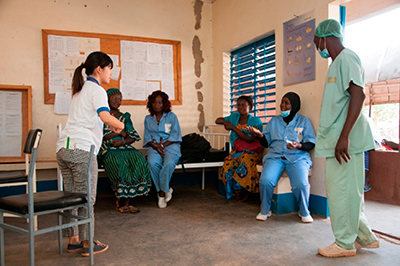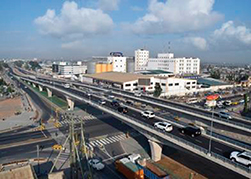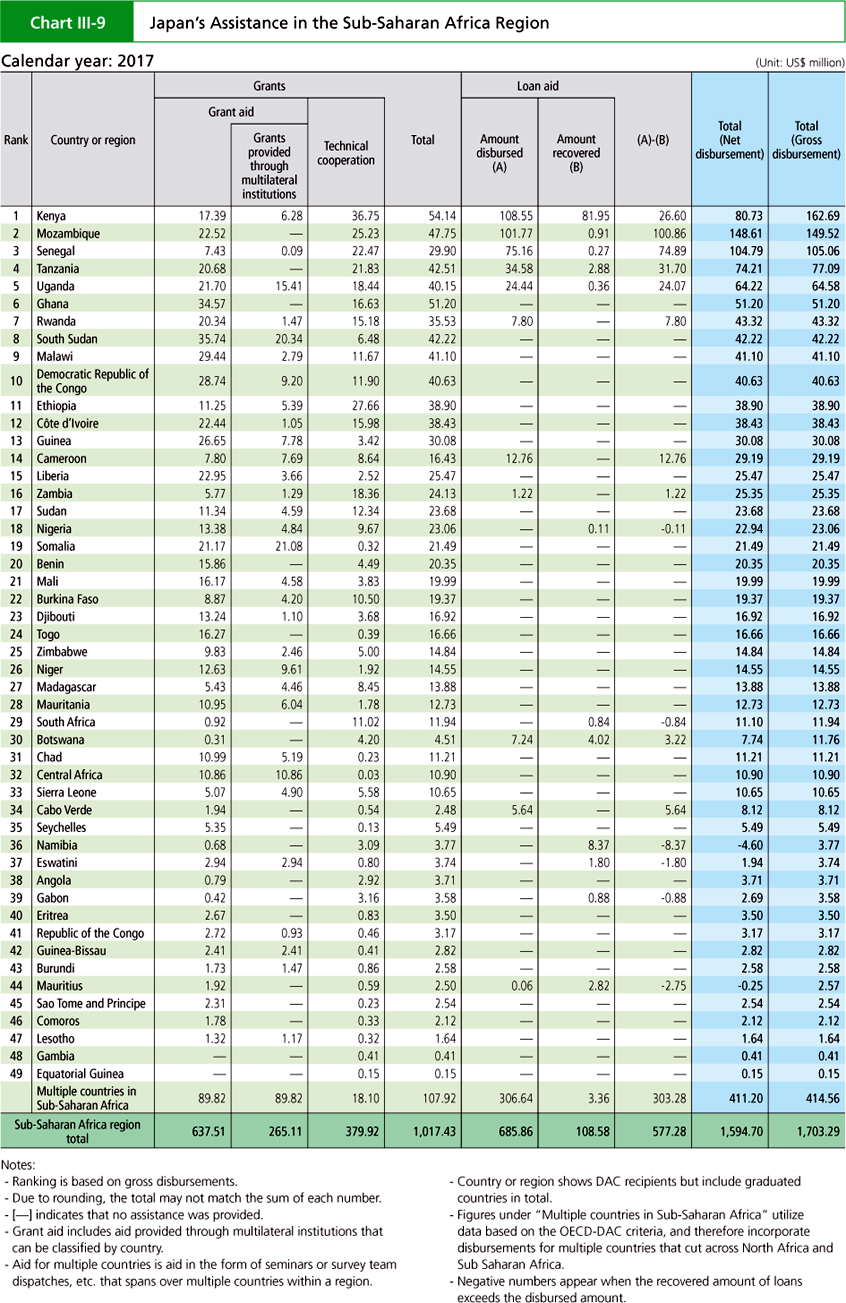8 Africa
The region of Sub-Saharan Africa, which is located in the south of the Sahara Desert, has immense potential owing to its rich natural resources and a population of 1.2 billion people. In recent years, however, it faces new challenges including the decline in global commodity prices, fragile health systems, and the emergence of terrorism and violent extremism. In response to these issues, the African Union (AU) Summit held in 2015 adopted the “Agenda 2063,” a new development agenda for Africa itself. In addition, during the same year, the UN newly adopted the “2030 Agenda for Sustainable Development.” As such, the international community has started to tackle these challenges by closely supporting Africa’s own efforts.
■Japan’s Efforts
In cooperation with the international community, Japan co-organizes the Tokyo International Conference on African Development (TICAD) with the United Nations, the United Nations Development Programme (UNDP), the World Bank and the African Union Commission (AUC), as a framework for supporting the above-mentioned efforts by Africa itself. At TICAD VI, held in Nairobi, Kenya in 2016, discussions were held on the following themes: (i) Promoting structural economic transformation through economic diversification and industrialization, (ii) Promoting resilient health systems for quality of life, and (iii) Promoting social stability for shared prosperity. As the outcome of these discussions, the Nairobi Declaration, which sets out the direction of African development, was issued.
In response, and as a part of the TICAD VI initiatives, the Government of Japan announced that Japan would invest a total of approximately $30 billion from the public and private sectors in total for the future of Africa, including human resources development for approximately 10 million people, utilizing the strength of Japan (“Quality”), as well as the development of quality infrastructure, promotion of resilient health systems, and laying the foundations for peace and stability, etc. for a period of three years from 2016 to 2018. These initiatives also include efforts to nurture approximately 30,000 industrial human resources, increase the number of people with access to basic health services by approximately 2 million people across Africa, as well as save approximately 300,000 lives through assistance of more than $500 million. The Seventh Tokyo International Conference on African Development (TICAD 7) is scheduled to be held in Yokohama, Japan, in 2019.
One of the key issues in Japan’s African diplomacy is peacebuilding. Through the TICAD process, with the aim of realizing peace and stability in Africa, Japan has provided support of approximately $100 million since 2008 for projects that have benefitted PKO training centers in 15 African countries, and dispatched a total of 56 Japanese lecturers to provide assistance for training and planning in relation to peacebuilding. In South Sudan, significant progress has been made toward the restoration of peace and stability, as represented by the signing of the Revitalized Agreement on the Resolution of the Conflict in South Sudan in September 2018 by the relevant parties. It is important for the international community to cooperate in providing support for the consolidation of peace in South Sudan in order to enable the citizens of the country to gain a real sense of peace being established and avoid the recurrence of conflicts.

Ms. Mari Okazaki, a Japan Overseas Cooperation Volunteer (JOCV), engaged in an activity at her post at the Sapone Health Bureau in Burkina Faso. (Photo: Anne Mimault)
Since the independence of South Sudan, Japan has supported its nation-building through JICA and international organizations, in areas such as infrastructure development, development of alternative industries, improvements in the fields related to basic human needs, and enhancement of governance. Despite the nation-building efforts after the security situation worsened in South Sudan in 2013, Japan has been cooperating with the international community to provide support for the consolidation of peace in the country through the Intergovernmental Authority on Development (IGAD), a regional organization of East Africa. In March 2018, Japan provided assistance of around $36 million to IGAD, which was applied to hold discussions on the Revitalized Agreement on the Resolution of the Conflict in South Sudan and to implement the provisions of the Agreement. Furthermore, Japan has also provided support for the citizens’ dialogue process, alongside support for human resources development in the areas of public finance management, strengthening the police force capacity development, and capacity-building for customs personnel, as well as humanitarian assistance including food assistance, which plays an important role in the restoration of peace and stability in South Sudan.
●Tanzania
The Project for Improvement of Tazara Intersection
Grant Aid (February 2016 – October 2018)
Tanzania’s largest city, Dar es Salaam, plays an important role, not only as an important traffic hub, but as a starting point for the distribution of goods to inland countries across the African continent. However, increased population, and increased traffic due to intensified economic activity, have led to higher rates of congestion every year, which has impacted economic activity in Tanzania and neighboring countries.

The completed Tazara Intersection (Photo: Oriental Consultants Global)
Therefore, Japan supported the grade separation of the Tazara Intersection where two major trunk roads intersect and congestion is most intense within Dar es Salaam, through the Grant Aid project, the “Project for Improvement of Tazara Intersection.” Tanzania’s first flyover was completed in approximately three years, without incident, thanks to the introduction of Japanese-style safety management in the construction process.
On September 27, 2018, an opening ceremony was held, attended by many stakeholders, including President Magufuli and the Ambassador of Japan to Tanzania, Shinichi Goto. The President stated at the ceremony that he wishes to consider further construction of flyovers, given the amazing results of the Tazara Intersection.
The completion of this flyover is expected to greatly alleviate the traffic congestion, expand the distribution of goods, and increase the value of Dar es Salaam as a commercial city. In addition, this flyover will contribute significantly to the Tanzanian economy, and serve as a symbol of the many years of good relationship between Japan and Tanzania. Thus, it is highly praised not only in Dar es Salaam, but nationwide.
![[Japan’s international cooperation policy] Priority issues in the Africa region](imgs/p101_2.jpg)

